Obayashi Group's Strengths by the Numbers
Since its founding, the Obayashi Group has amassed technologies and expertise in the “building of things,” enabling it to tackle epoch-making projects that respond to the demands of society.
The Group will provide added-value service to society by expanding the construction value chain from initial development through to renewal and renovation, centered on the spirit of honest craftmanship and on the solid technology that are the hallmarks of its history and the tradition it has followed since its foundation.
(Values shown below FY are the results of the fiscal year or values as of the end of the fiscal year)
Founded
133 years ago

In 1892, Obayashi Corporation was founded in Osaka as a civil engineering and building construction contractor, “Obayashi Store.”
No matter how the times change, the spirit of “honest craftsmanship” that has been cultivated by facing our customers and society with sincerity has been passed down from generation to generation.
Number of Group Companies and Overseas Offices
152 Companies and 19 Countries and Regions

The Obayashi Group is pursuing construction and construction-related businesses in North America, Southeast Asia, Oceania, and other regions. In doing so, it leverages the high degree of technological prowess that it has cultivated in the domestic construction business.
Number of Employees (Consolidated)
17,305

The Obayashi Group believes it is essential to value each person with a stake in its business, as stated in the Obayashi Philosophy, because it is the strength of each and every employee that supports companies. The Group strives to provide professional growth opportunities and create rewarding workplaces for our employees as part of our quest to improve corporate value by maximizing individual and organizational performance.
Number of member companies of Obayashi Rin-yu-kai
Approx. 1,200 Companies

Obayashi Rin-yu-kai was established in Osaka in 1906 as an organization of suppliers and subcontractors that worked exclusively with Obayashi Corporation founder and president Yoshigoro Obayashi. It will celebrate its 120th anniversary in 2025. As an organization boasting supplier and subcontractor members from all over Japan, the Obayashi Rin-yu-kai works with Obayashi Corporation to improve technologies around safety and quality.
Based on the Obayashi Basic Principles, the Obayashi Group works to solve social and corporate sustainability issues through its business using both financial and non-financial capital, aiming to achieve its long-term vision, Obayashi Sustainability Vision 2050.
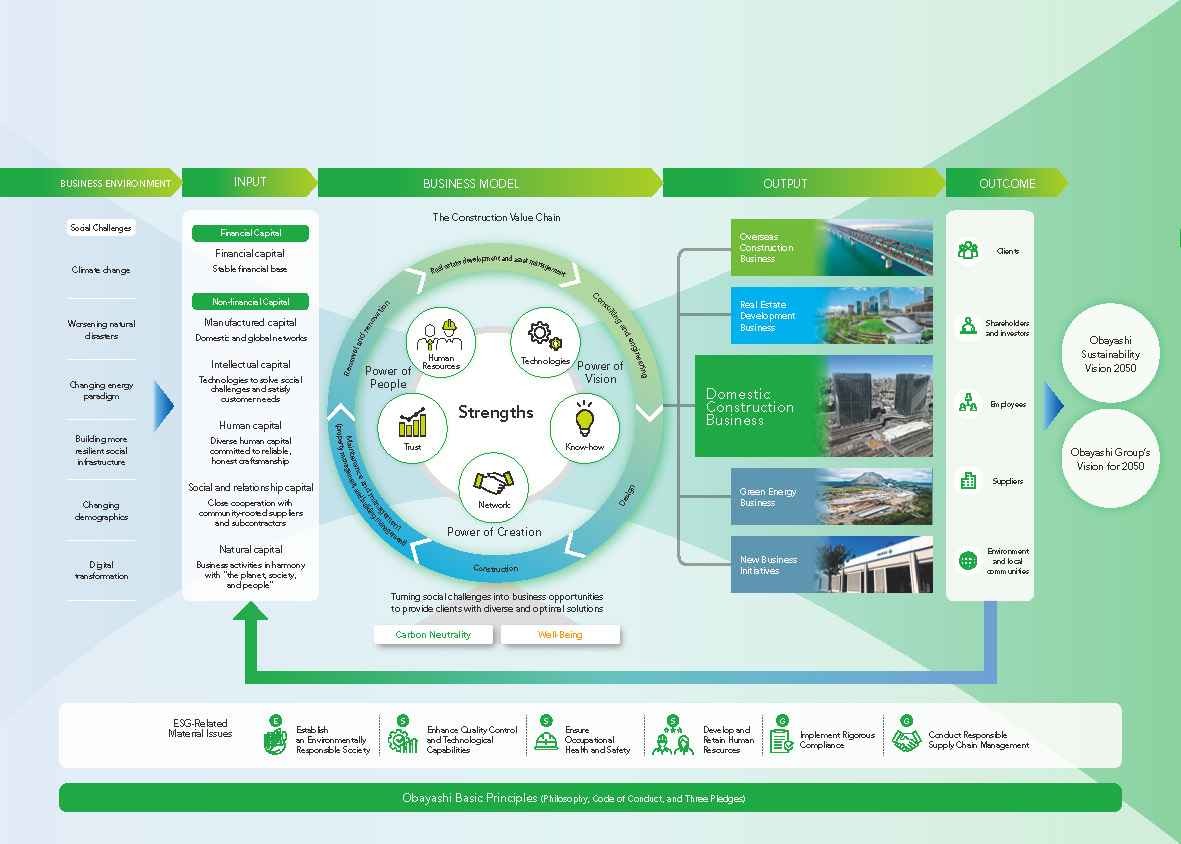
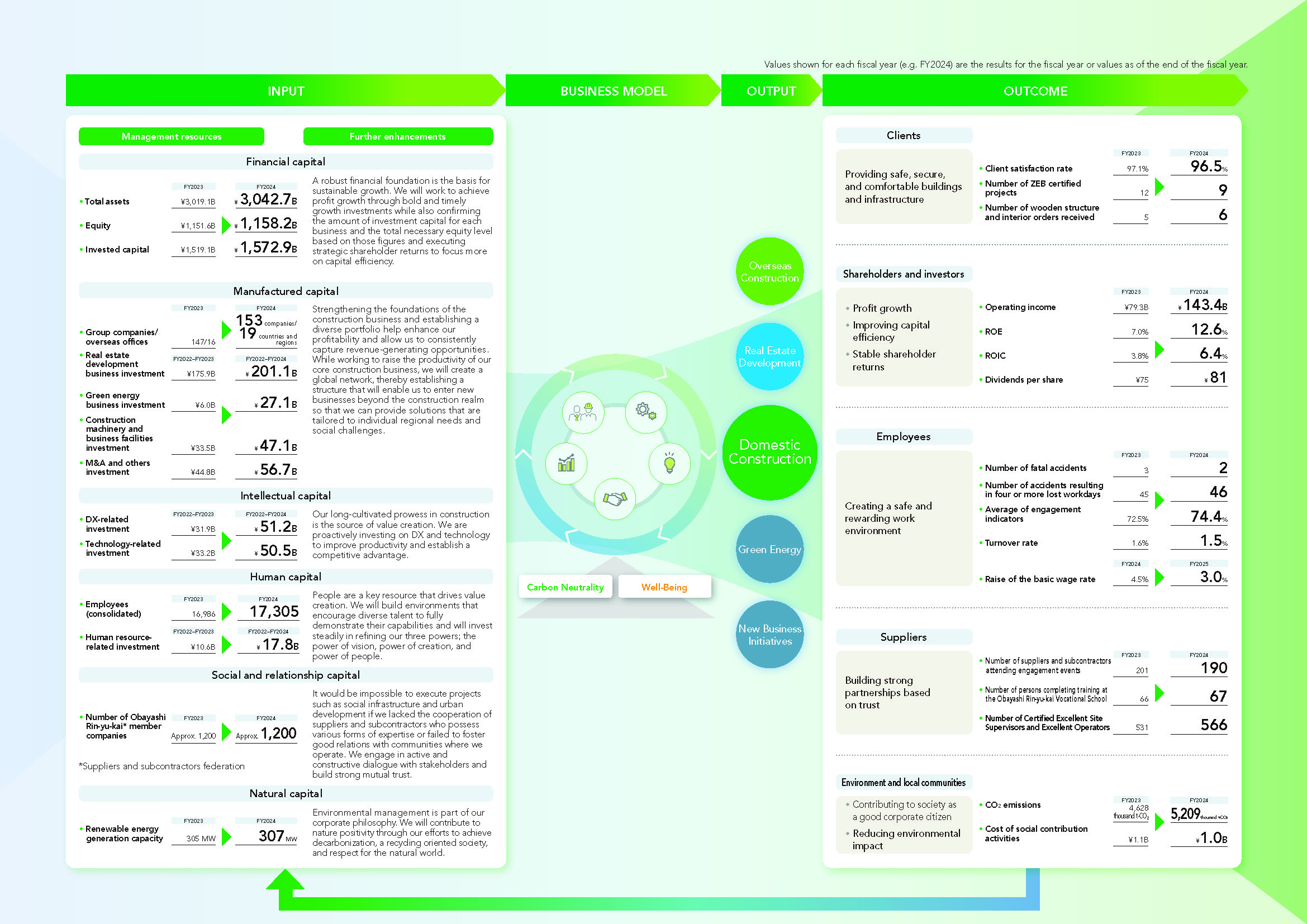
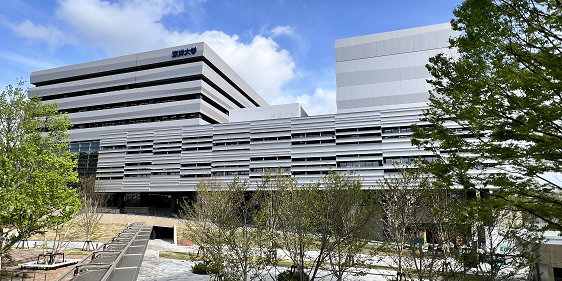
- Solid demand in areas such as factories, data centers, redevelopment, renewal and renovation, and smart cities
- Increase in private-sector construction demand boosted by factors including policies to strengthen supply chains of specified critical products
- Rapidly increasing and diversifying customer needs relating to social issues, such as carbon neutrality and well-being
- Price rises on a wide range of construction materials, as well as increased labor costs
- Tight supply chain conditions due to increased demand
- Shortage of engineers and workers in the construction industry resulting from a declining birthrate and aging population
- Intensifying competition due to lack of expected significant expansion of the domestic construction market
- Ability to make high-value-added proposals that demonstrate comprehensive prowess through cooperation among marketing, design,procurement divisions and construction sites, and Group companies
- Ability to handle various types of construction, together with our supply chains, backed by our experience in numerous building projects for a wide variety of purposes nationwide
- Construction management capabilities that fuel the provision of high-quality buildings supported by optimal construction plans and sound process management
- Technical capabilities that enable the development of innovative production systems, such as the development and application of next-generation technologies and systems and the utilization of DX
- Growing demand for infrastructure development, including the Japanese government’s policy to build national resilience
- Improvement of profitability in future growth areas, such as renewable energy
- Increased costs due to changes in ordering methods and acceleration of decarbonization efforts
- Shortage of skilled workers in the construction industry due to the declining birthrate and aging population
- Intensifying competition for renewal projects
- Strong technical capabilities and wealth of expertise that can be used in growth fields
- Thorough safety management awareness and environment-conscious business promotion
- Promotion of construction DX through automation and autonomization technologies
- Comprehensive Group strength, with strong internal cooperation on solving social issues, such as environmental restoration and carbon neutrality
- Organization structure that integrates technological development, marketing, and production support and construction capability based on close cooperation with suppliers and subcontractors
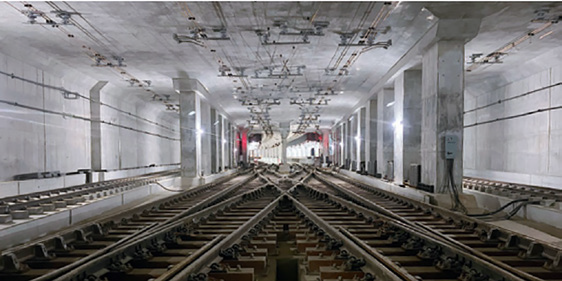
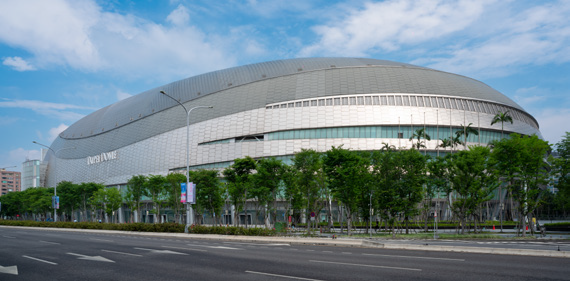
- Accelerating global efforts toward carbon neutrality and decarbonization
- Changing markets in the wake of changing economies and corporate activities (globalization and DX)
- Growing demand for the development of social infrastructure with low environmental impact
- Stable water treatment infrastructure market in the United States, transportation infrastructure project demand in the Asia region
- Increase in materials costs and the rebuilding of the supply chain due to U.S. tariff policy
- Soaring fuel, transportation, and materials costs due to the Russia-Ukraine situation and prolonged geopolitical tensions in the Middle East between Israel and Palestine
- Concerns about the economic security of Taiwan and other countries where we do business and assuring employee safety in the event of an emergency, as well as business continuity risk in such a situation
- Diverse global human resources nurtured through our overseas trainee system, our Group training sessions for locally hired staff, and personnel exchange among overseas offices
- A business foundation in our existing overseas operations that is expanding and growing stronger through M&A and other measures
- Strengthened data center project initiatives through cooperation among data center design teams centered on the Asia-Pacific Regional Headquarters
- Promotion of decarbonization and well-being-oriented architecture utilizing Obayashi’s proprietary technologies (LEED and WELL Gold certification for O-NES TOWER (Thai Obayashi) and recognition for the construction of wooden structures and interiors in Australia)
- A subsidiary that is a leading U.S. water treatment facility construction company
- Know-how and expertise in development of social infrastructure primarily in Southeast Asia
- Social demand related to carbon neutrality, well-being, and other sustainability-related issues
- Emergence of new growth areas that meet customer needs, such as wooden structures and interiors
- Growing demand for smart buildings as digitalization progresses
- Changes in office needs associated with application of overtime caps and changes in work styles
- Rise in vacancy rates and fall in rents due to large supply of office space and distribution warehouses
- Decline in demand and deterioration in profitability of the real estate development business due to rise in interest rates in Japan and overseas, etc.
- Ability to secure continuous and stable rental profit by reshuffling our portfolio, with a plan on making new investments in the amount of ¥300.0 billion with net investment of ¥160.0 billion after property sales worth ¥140.0 billion over five years
- Expand fee-based non-asset business through private funds by leveraging the Obayashi Group’s real estate management and operational expertise
- Strengthening of our earnings base by expanding building uses from offices to logistics facilities, rental housing, and other purposes, and diversifying and globalizing our portfolio through building development, ownership, and operation not only in Japan, but also in Bangkok and London
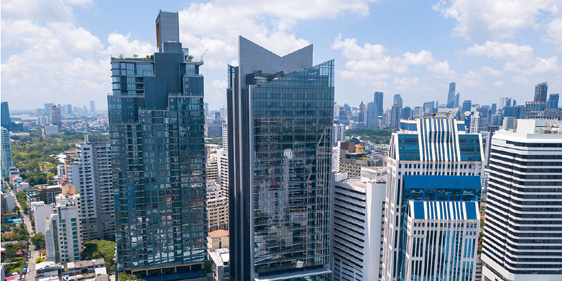
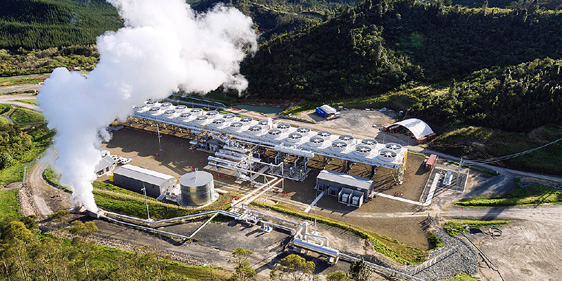
- Stronger initiatives by national and local governments to turn renewable energy into a major power source and promote the society-wide adoption of hydrogen
-
The forecast expansion of electricity demand due in part to widespread use of generative AI
-
The advance and diversification of customers’ decarbonization needs
- Increased development and operating costs due to rising prices and other factors
- Power generation failures and equipment problems caused by abnormal weather events such as typhoons, heavy rains, thunderstorms, and other natural disasters
- Changing renewable energy-related policies, laws, and regulations
- Track record in the development and operation of solar power, onshore and offshore wind power, woody biomass, and the field survey of geothermal power generation facilities, and the production, transportation, and sale of green hydrogen
- Ability to respond to various customer needs through synergies among the construction, real estate development, and new businesses
- Technological and management capabilities cultivated through the construction business

